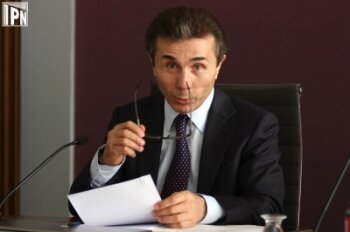Bidzina Ivanisvhili’s letter in Wall Street Journal: “Progress Through Pragmatism in Georgia “
06 August, 2013
 Prime Minister of Georgia Bidzina Ivanishvili published a letter in the Wall Street Journal analyzing current political situation in Georgia, reforms carried out by his government and foreign policy attitudes.
Prime Minister of Georgia Bidzina Ivanishvili published a letter in the Wall Street Journal analyzing current political situation in Georgia, reforms carried out by his government and foreign policy attitudes.“Five years after a disastrous conflict with Russia in August 2008, a fifth of Georgia's territory remains occupied, behind barbed wire. As I noted in these pages a year ago, during the campaign for last October's parliamentary election, my objective in entering politics is to improve the lives of all Georgians, despite the odds. Today we are on the right track, but we need strong international support to defy our skeptics and achieve our goals.
The government of my Georgian Dream coalition strives to cooperate with the opposition, carrying out pragmatic policies and concrete reforms on the path to the country's modernization and full democracy. Georgia is already a key byway for Caspian energy and the resources of the new Silk Road. We intend to make the country an example of a stable democracy and a reliable partner for Europe and the U.S., as well.
"Pragmatic" means ending the Cold War rhetoric and avoiding the irresponsible actions that led us into the 2008 conflict. Trade with Russia is being allowed to resume as a confidence-building measure, but we remain firm on the return of Russian-occupied Abkhazia and South Ossetia. This issue should be handled in compliance with the principles of international law, which will require active engagement from international organizations and from our Western partners.
Despite our critics' claims to the contrary, "Georgia has already moved closer to NATO by adopting bold reforms," in the words of NATO Secretary General Anders Fogh Rasmussen this month. According to Stefan Füle, the EU enlargement commissioner, the "myth" that Georgia is not pursuing the democratic reforms needed for a European Union Association Agreement in time for the Vilnius summit in November "needs to be dispelled."
"Pragmatic" also means assuming our international responsibilities. Our soldiers still serve in the most dangerous areas in Afghanistan despite tragic losses. And with four key oil pipelines running through Georgia, our government has declared its intent to join the Energy Community.
"Concrete" means focusing on democracy, with reforms aimed at following through on what the 2003 Rose Revolution failed to do. We are instituting a genuine rule of law, stronger labor protections, education reform and universal health care, which became available last month. We still need constitutional reform that better distributes power between the branches of government.
On justice, the U.S. State Department's 2012 human-rights report on Georgia echoed the EU's annual assessment of the country in noting the need to investigate accusations of torture and human-rights violations committed by law-enforcement agencies. That is exactly what we are doing now.
We have also taken concrete steps toward liberalizing the criminal justice system. A defendant in Georgia now has the right to see all the evidence against him and will face an independent judge in a courtroom open to the media. President Saakashvili admitted in a recent interview that under his government, "the judiciary was not totally independent." We have changed this.
Since Georgian Dream's electoral victory last October, citizens have filed some 20,000 complaints against former government officials. Our justice system is carefully investigating these cases, following due process with the help and watchful eyes of EU human-rights envoy Thomas Hammarberg, the U.S. Justice and State Departments, the Organization for Security and Cooperation in Europe, and numerous international NGOs.
We are also making concrete economic reforms, revitalizing the agricultural sector, creating a fair tax system, and eliminating political pressure on and extortion of private businesses. After some uncertainty following the elections, investment and exports have rebounded, and our reforms will pay large dividends over the next decade.
Despite the clear progress, however, our government is under fire from those who should be allies in our quest for trans-Atlantic integration. Vocal minorities in Europe and the United States—many of whom ignored years of official reports of past abuses—have misguidedly attacked the arrests of former government officials as antidemocratic.
Pushing Georgia away at such a critical point in our history would be short-sighted and potentially destabilizing for a small country in a very dangerous neighborhood. I ask that our critics look at the facts: We are following internationally supervised due process. We also invite international monitors to oversee the trials of these former officials, and to supervise the upcoming presidential election, in October.
I embarked on this political voyage after years of philanthropy and financial support for the Saakashvili government. I discovered that I needed to form a new government to bring real change and to revive hopes of reuniting our divided land. I believe we are on track. But as we head toward the presidential election and November's EU-Eastern Partnership summit in Vilnius, we need stronger international support so we can continue to realize the aspirations of millions of Georgians, the aspirations that once represented the ideals and hopes of the Rose Revolution,” Bidzina Ivanishvili’s letter published in Wall Street Journal reads.





















































